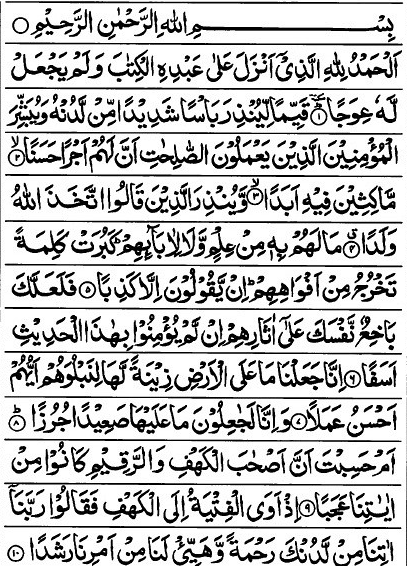Surah Kahf (The Cave) is the 18th Chapter of the Quran and was revealed in Makkah. It contains 110 verses spread over two juz (para) – 15th and 16th. The Prophet (SAW) instructed Muslims to recite the whole chapter every Friday. But there was special mention of the first 10 verses of Surah Kahf and we shall look at their importance and benefits here.
Surah Kahf in Quran (Arabic)

Translation of first 10 ayat of Surah Kahf
All praise is for Allah Who has revealed the Book to His servant, allowing no crookedness in it – making it perfectly upright, to warn the disbelievers of a severe torment from Him; to give good news to the believers—who do good—that they will have a fine reward – in which they will remain forever – and to warn those who claim ‘Allah has offspring’ –
They have no knowledge of this, nor did their forefathers. What a terrible claim that comes out of their mouths! They say nothing but lies – Now, perhaps you O Prophet will grieve yourself to death over their denial, if they continue to disbelieve in this message – We have indeed made whatever is on earth as an adornment for it, in order to test which of them is best in deeds – And We will certainly reduce whatever is on it to barren ground – Have you O Prophet thought that the people of the cave and the plaque were the only wonders of Our signs? –
Remember when those youths took refuge in the cave, and said, “Our Lord! Grant us mercy from Yourself and guide us rightly through our ordeal.”
Read about Ayatul kursi and its rewards and benefits here >>
Surah Kahf Transliteration – First 10 verses
- Alhamdu lillaahil latheee anzala ‘alaa ‘abdihil kitaaba wa lam yaj’al lahoo ‘iwajaa
- Qaiyimal liyunthira ba’asan shadeedam mil ladunhu wa yubashshiral mu’mineenal latheena ya’maloonas saalihaati anna lahum ajran hasanaa
- Maakitheena feehi abadaa
- Wa yunziral latheena qaalut takhazal laahu waladaa
- Maa lahum bihee min ‘ilminw wa laa li aabaaa’ihim; kaburat kalimatan takhruju min afwaahihim; iny yaqooloona illaa kathibaa
- Fala’allaka baakhi’un nafsaka ‘alaaa aasaarihim illam yu’minoo bihaathal hadeethi asafaa
- Innaa ja’alnaa ma ‘alal ardi zeenatal lahaa linabluwahum ayyuhum ahsanu ‘amalaa
- Wa innaa la jaa’iloona maa ‘alaihaa sa’eedan juruzaa
- Am hasibta anna Ashaabal Kahfi war Raqeemi kaanoo min Aayaatinaa ‘ajabaa
- Iz awal fityatu ilal Kahfi faqaaloo Rabbanaaa aatinaa mil ladunka rahmatanw wa haiyi’ lanaa min amrinaa rashadaa
hadith of Surah Kahf first 10 verses
There are a number of hadith which signify the special importance of Surah Kahf including the following which especially mentions the first 10 verses:
Abu Darda (RA) reported: The Prophet (SAW) said, “Whoever memorizes ten verses from the beginning of Surat al-Kahf will be immune to the False Messiah.”
In another narration, the Prophet said, “From the last ten verses of Surat Kahf.”
(Muslim)
Surah Kahf Benefits
A number of benefits and virtues are granted to the one who recites Surah Kahf:
- Gives protection from the trials and tribulations of Dajjal the False Messiah
- Gives a spiritual light that extends from one Friday to the next
- Brings calmness and serenity while reading it
Why you should read Surah Kahf on a Friday
Abu Sa’id al-Khudri (RA) reported: The Prophet (SAW) said, “Whoever recites Surah Kahf on Friday will have a light between this Friday and the next.” (al-Sunan al-Kubrá)
Al-Bara’ ibn ‘Azib reported: A man was reciting Surah al-Kahf and in his barn was an animal that became unsettled. As he looked, there was a mist or a cloud overshadowing him. He mentioned that to the Prophet (SAW), and he said, “Continue reciting, for it was calm which descended with the Quran, or for the Quran.” (Bukhari and Muslim)
Learn about the angels in the Quran here >>
Surah Kahf can be read anytime after sunset on Thursday up to sunset time on Friday, and so this whole period is counted as being the day of Friday as per the hadith. As a tradition, Muslims in many countries read this Surah before the Jumuah Prayer but it can be read anytime.



